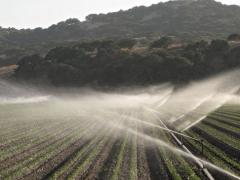A comprehensive quantification of global nitrous oxide sources and sinks.
Global human-induced emissions of nitrous oxide, which are dominated by nitrogen additions to croplands, increased by 30% over the past four decades to 7.3 (4.2-11.4) teragrams of nitrogen per year. This increase was mainly responsible for the growth in the atmospheric burden. Our findings point to growing N2O emissions in emerging economies-particularly Brazil, China and India.
Nitrous oxide (N2O), like carbon dioxide, is a long-lived greenhouse gas that accumulates in the atmosphere. Over the past 150 years, increasing atmospheric N2O concentrations have contributed to stratospheric ozone depletion and climate change, with the current rate of increase estimated at 2 per cent per decade. Existing national inventories do not provide a full picture of N2O emissions, owing to their omission of natural sources and limitations in methodology for attributing anthropogenic sources. Here we present a global N2O inventory that incorporates both natural and anthropogenic sources and accounts for the interaction between nitrogen additions and the biochemical processes that control N2O emissions. We use bottom-up (inventory, statistical extrapolation of flux measurements, process-based land and ocean modelling) and top-down (atmospheric inversion) approaches to provide a comprehensive quantification of global N2O sources and sinks resulting from 21 natural and human sectors between 1980 and 2016. Global N2O emissions were 17.0 (minimum-maximum estimates: 12.2-23.5) teragrams of nitrogen per year (bottom-up) and 16.9 (15.9-17.7) teragrams of nitrogen per year (top-down) between 2007 and 2016. Global human-induced emissions, which are dominated by nitrogen additions to croplands, increased by 30% over the past four decades to 7.3 (4.2-11.4) teragrams of nitrogen per year. This increase was mainly responsible for the growth in the atmospheric burden. Our findings point to growing N2O emissions in emerging economies-particularly Brazil, China and India. Analysis of process-based model estimates reveals an emerging N2O-climate feedback resulting from interactions between nitrogen additions and climate change. The recent growth in N2O emissions exceeds some of the highest projected emission scenarios, underscoring the urgency to mitigate N2O emissions.
Authors
Specifications
- Publication title
- A comprehensive quantification of global nitrous oxide sources and sinks.
- Publication date
- 7 October 2020
- Publication type
- Article
- Page count
- 8
- Publication language
- English
- Magazine
- Nature, 586(7828)
- Product number
- 4342




